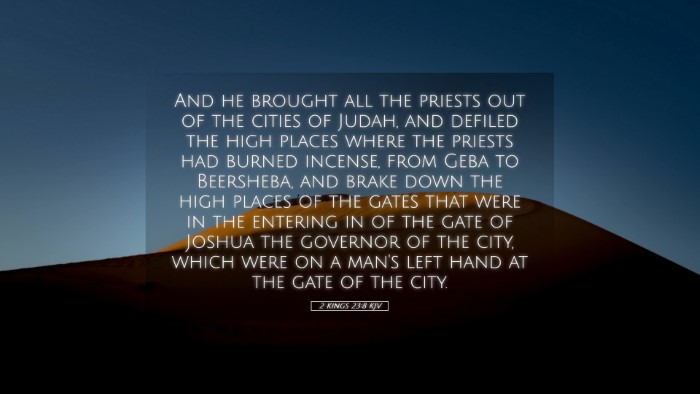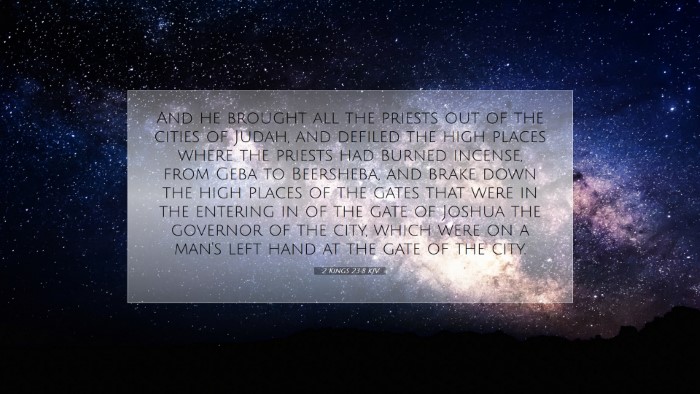Commentary on 2 Kings 23:8
Verse in Context: 2 Kings 23:8 states: "And he brought all the priests out of the cities of Judah, and defiled the high places where the priests had burned incense, from Geba to Beer-sheba, and broke down the high places of the gates that were in the entering in of the gate of Joshua the governor of the city." This verse is a significant part of King Josiah's reforms. It underscores the zeal for monotheism and the restoration of true worship in Israel.
Historical Context
Albert Barnes emphasizes the importance of recognizing the extent of the idolatrous practices that had infiltrated Judah during the reigns of previous kings. Josiah's reign marked a critical turning point, as he sought to cleanse the land of these corrupt influences.
The Reformative Actions of Josiah
King Josiah's actions, as noted by Matthew Henry, were deeply rooted in his commitment to God's covenant with Israel. His reforms came after the significant discovery of the Book of the Law, which illuminated the discrepancies between the worship of Yahweh and the practices allowed by earlier kings.
Josiah's defilement of the high places was a radical move against established norms, showing a commitment to eliminating syncretism that had crept into worship practices. He not only abolished the worship of false gods but actively sought to restore pure worship according to the precepts outlined in the Law.
The Symbolism of Geba to Beer-sheba
Adam Clarke provides insight into the significance of the locations mentioned: Geba was in the north, and Beer-sheba was in the south, indicating the comprehensive nature of Josiah's reforms across the nation. This geographical scope reveals Josiah’s intent to unify worship practices and eradicate idolatry throughout all of Judah.
The Role of the Priests
In this verse, the priests are forcibly brought out of their cities, further illustrating the intense action taken by Josiah. As Matthew Henry comments, this was not merely an administrative change but a spiritual reawakening. The priests, who had facilitated the worship of idols, were now compelled to confront the realities of their actions and the consequences of their leadership.
Key Points:
- The priests faced accountability for their roles in leading the people into idolatry.
- Josiah’s actions served both to cleanse and to reinstate correct worship.
Spiritual Implications
Albert Barnes highlights the spiritual ramifications of such reforms. They were not just political or social changes but were fundamentally spiritual realignments. The act of defiling high places symbolized a break from the past and a renewal of covenant faithfulness to God.
This illustrates a broader theological principle: the necessity of purification in one's life. As believers today reflect on this historical event, it prompts a question of personal and communal worship integrity.
Lessons for Today
Josiah's reform invites modern Christians to consider how they may have unwittingly incorporated worldviews or practices that detract from their devotion to God. Matthew Henry encourages leaders and laity alike to examine their worship attitudes and practices in light of scripture.
- Examine personal and communal worship practices.
- Strive for purity in devotion, following the word of God.
Conclusion
The verse encapsulates a moment of decisive reform where a leader chose to honor God above all else, seeking to cleanse Israel from idolatrous practices. Josiah’s legacy teaches us about the importance of having leaders who passionately pursue God’s righteousness. For pastors, students, theologians, and scholars alike, 2 Kings 23:8 serves as a pivotal reminder of the ongoing relevance of scriptural fidelity in all aspects of worship and life.


